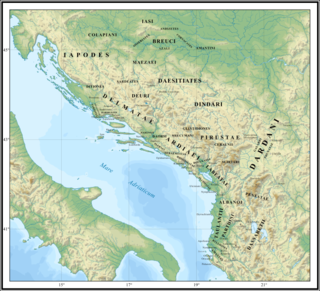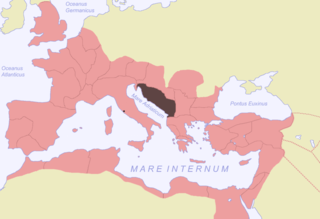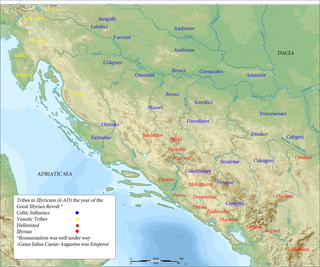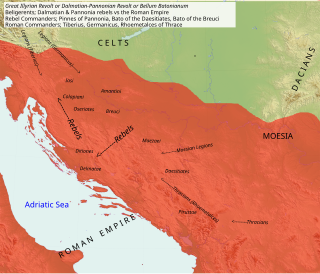Related Research Articles

In classical antiquity, Illyria was a region in the western part of the Balkan Peninsula inhabited by numerous tribes of people collectively known as the Illyrians.
Bato may refer to:

Illyricum was a Roman province that existed from 27 BC to sometime during the reign of Vespasian. The province comprised Illyria/Dalmatia in the south and Pannonia in the north. Illyria included the area along the east coast of the Adriatic Sea and its inland mountains, eventually being named Dalmatia. Pannonia included the northern plains that now are a part of Serbia, Croatia and Hungary. The area roughly corresponded to part or all of the territories of today's Albania, Kosovo, Montenegro, Serbia, Bosnia and Herzegovina, Croatia, and Slovenia.

Bato the Daesitiate was a chieftain of the Daesitiates, an Illyrian tribe which fought against the Roman Empire between 6 and 9 AD in a conflict known as Bellum Batonianum.

Bato the Breucian or Bato of the Breuci was the chieftain of the Breuci, an Illyrian tribe that fought against the Roman Empire in a war known as Bellum Batonianum. Bato joined his rebel forces with those led by Bato of the Daesitiates. After facing defeat, he surrendered to Tiberius in 8 AD on the bank of the Bosna river. Ultimately, Bato of the Breuci was captured by Bato of Daesitiates and was put to death after a decision was made by an assembly of the Daesitiates.

The Bellum Batonianum was a military conflict fought in the Roman province of Illyricum in the 1st century AD, in which an alliance of native peoples of the two regions of Illyricum, Dalmatia and Pannonia, revolted against the Romans. The rebellion began among native peoples who had been recruited as auxiliary troops for the Roman army. They were led by Bato the Daesitiate, a chieftain of the Daesitiatae in the central part of present-day Bosnia and Herzegovina, and were later joined by the Breuci, a tribe in Pannonia led by Bato the Breucian. Many other tribes in Illyria also joined the revolt.
Longarus was an Illyrian king of the Dardanian Kingdom. Longarus was at war with various Macedonian kings and managed to conquer at different times part of Macedonia. Longarus was an ally of the Paeonian State and liberated the Paeonians in order to open the routes towards Macedonia. Longarus' influence grew and many other Illyrians from the Ardiaean Kingdom joined him.
Bato was an Illyrian king of the Dardanian State. Bato was the son of Longarus whom he succeeded and the brother of Monunius II who ruled after him. Bato fought alongside the Romans against Macedon during the Second Macedonian War. Bato is known for using advanced war tactics against Athenagoras. Bato became a major threat to the Macedonians but after the war was over Dardanian and Roman relations soon diminished.
Plator the Illyrian was brother to King Gentius, the last Illyrian king of the Ardiaean State.
Etuta was an Illyrian queen of the Ardiaean Kingdom, married to Gentius. Etuta was a Dardanian princess, the daughter of Monunius II of Dardania.

The Illyrian Kingdom is the name of a country that existed on the Western part of the Balkan Peninsula in ancient times and represented an alliance of Illyrian tribes that was under the rulership of a single leader, expressly referred to as "King of the Illyrians" in ancient historical records.
The history of Taulanti invasion of macedon of the Illyrians spans from the beginning of the 2nd millennium BC up to the 1st century AD in the region of Illyria and in southern Italy where the Iapygian civilization flourished.

Monunius was an Illyrian king of the Dardanian State who lived in the late 3rd century BC and early 2nd century BC. Monunius attested first in 176 BC was the son of Longarus, a Dardanian king who caused much trouble to Macedonia from 230 BC onwards. He succeeded his brother Bato to the Dardanian throne. Monunius was known for his victory he inflicted on the Bastarnae during the Bastarnae Invasion of Dardania.
Pleuratus III was a ruler of the Illyrian kingdom under the Labeatan dynasty. He was the son of Scerdilaidas. Pleuratus continued his father's pro-Roman policy even more decidedly, so much that his loyalty to Rome was well known, even to other dynasts. He managed to extend the boundaries of the Illyrian State in the south when he was rewarded land annexed by Philip V of Macedon. He became one of the most prominent Illyrian kings of the time all because of his loyalty to the Romans. Pleuratus was succeeded by his son Gentius, who was the last Illyrian king.
The Roman–Dalmatian wars were a series of conflicts between the Dalmatae (Delmatae) and the Romans. After the fall of the Ardiaei in southern Illyria, the Dalmatae were to pose the greatest force against the Romans in their conquest of Illyria.
The Battle of Phoenice was a battle that took place in 230 BC between the forces of the Epirote League and the Ardiaean Kingdom of Illyria.
Arduba was a settlement of the Illyrian tribe of the Daesitiates in Illyria. Following the Roman invasion, the settlement was included in the Roman province of Dalmatia. Arduba was located somewhere near the modern city of Zenica in Bosnia and Herzegovina. Most probably the royal city of Vranduk existed in the time of the Illyrians, under the name Arduba.
Bato is an Illyrian name.
References
- ↑ Sir William Smith (1850). Dictionary of Greek and Roman biography and mythology. C.C. Little and J. Brown. pp. 475–.